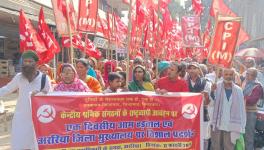IR Code: Amid COVID-19 Surge, Centre Proposes to ‘Limit’ Scope of Collective Bargaining in Industries
It could well be another classic case of misplaced priorities – if not indifference – of the Centre at a time when the COVID-19 pandemic rages across the country like never before. However, the move fails to surprise those sticking to their guns and accusing the Narendra Modi-led dispensation of a “criminal bend” against workers.
On Wednesday the Union Ministry of Labour & Employment proposed to demarcate the scope of collective bargaining in establishments across the country, thereby tilting the labour regulation regime in favour of employers, unsurprisingly, at the cost of the workers’ interests.
The suggestions, which form part of the latest set of draft rules for the Industrial Relations Code, 2020, further empower employers under a first-of-its-kind nationwide mechanism of “recognising” a trade union as a negotiating body, while remaining silent on the rights and liabilities of the latter within the industrial setup.
The matters pertaining to workers which the negotiating body – union or council – is to mediate with the employer, are delimited to “conditions of service” and “terms of employment”. It leaves out matters such as social security of the workers among others, according to the draft rules on Section 14 and 22 of the IR code.
The above mentioned sections of the code respectively deal with the “recognition” of the negotiating union or council and adjudication of disputes of trade unions in an industrial establishment.
As per the proposed rule, only matters relating to wages, work hours, leaves, working conditions, and safety of the workers, among others, will be negotiated in establishments wherein a registered trade union or multiple unions are recognised to carry forward such talks on behalf of the workforce.
The draft rules say that a registered trade union requires membership of not less than 30% of the total workforce to be recognised as the “sole negotiating union of the workers”; in case of multiple unions this threshold is 51%, according to the IR code. In case both the provisions are not met, then the council formed will consist of representatives from all the registered trade unions with the support of at least 1/5th of the workforce within the establishment.
However, negotiation on “any other matter” – other than those listed – is possible only after it is “agreed between employer of the industrial establishment and negotiating union or council,” the draft rules, made public by the Centre for inviting stakeholders’ suggestions within a period of 30 days, mention.
Labour experts warn that the draft rules in their current form, while defining the contours of a collective bargaining in country’s industrial setup for the first time, actually “limits” its scope.
“The lawmakers should have made a study of benchmark collective agreements before delimiting the scope of collective bargaining. The draft rules in their present form do a disservice to the very institution of collective bargaining,” said K.R. Shyam Sundar, professor and labour economist at XLRI Jamshedpur.
According to Sundar, matters relating to “social security” of the workers, or other “benefits”, are “glaringly” not included in Section 3 of the draft rules.
Furthermore, the draft rules empower the employer to appoint a “verification officer” who is tasked with verifying the membership of the trade unions in a time-bound manner for the purpose of constituting a negotiating body in the industrial establishment.
Calling the move “stupid”, Sundar flayed the government for potentially stripping the workers of their right to collectively negotiate with the management. “Think about it; in a classic adversarial industrial scenario, why would an employer initiate a process to ‘recognise’ a trade union as a negotiating body and thereby, put themselves in a rather challenged position?” he said.
According to the draft rules, the process of constituting a negotiating union shall commence three months before the expiration of the existing body. The trade union membership will be arrived at through a secret ballot, its process to be decided by the officer chosen by the employer.
There are already certain rules in place in states like Kerala, West Bengal, Maharashtra and Odisha wherein powers to regulate the verification of a trade union membership are entrusted with a state government-appointed registrar, Sundar argued.
This is however, set to change, as the draft rules propose, potentially in favour of the employers, who can now indirectly influence the membership verification process as questions remain over the “independent” nature of the duties discharged by the chosen verification officer.
The draft rules also remain silent on the rights, responsibilities and even liabilities of the ‘recognised’ trade union. “This is an essential ingredient that should have been included – at first in the law (IR code) itself… All this points towards a government approach that is ad-hoc and not comprehensive and encompassing in framing of the legislation,” Sundar continued.
The result is that the codes, and subsequently their rules, remain “vitally incomplete,” he added.
‘It is Literally Criminal’
The IR code, along with other two codes – Code on Social Security and Occupational Safety Health & Working Conditions Code – was passed by Parliament in September last year. Another one, the Code on Wages, was legislated in 2019 itself. In total, these laws will subsume 29 existing central labour enactments that deal with the protection of worker rights and privileges.
The IR Code will subsume The Trade Unions Act, 1926; The Industrial Employment (Standing Orders) Act, 1946 and the Industrial Disputes Act, 1947. The first set of draft rules for this code was released in October last year. Incidentally, formulation of rules pertaining to trade unions was then left to the state government.
Alleging that the codification of existing labour laws “weakens” the labour regulation regime, the Central Trade Unions (CTUs) have been up in arms against the Centre ever since the idea was first floated during the first innings of the Modi government.
On Wednesday, the All India Trade Union Congress (AITUC) said that the Centre, through codification, has “limit(ed) the protective cover of labour laws, openly in the name of 'ease of doing business'”.
Tapan Sen, general secretary, Centre of Indian Trade Unions (CITU), told Newsclick on Thursday that the process of floating draft rules by the ministry at this time, when the country’s workforce is reeling under the pressure of a second COVID-19 outbreak, shows the “criminal bend” of the Centre against workers.
“When the country is almost paralysed by the spread of COVID-19 and its workforce is faced with growing joblessness and wage cuts; at such a time, this is what the union labour ministry prioritises. It is literally criminal of them to do so,” Sen said in anger.
Notably, the Centre has recently drawn flak for keeping the Central Vista Project on track and not suspend the Kumbh earlier, even as COVID-19 cases surged exponentially in the country.
Subsequently, the health infrastructure in the country soon found itself under immense strain.
The situation looks grim on the economic front too. Over 7.5 million jobs were erased in the month of April, most possibly due to localised lockdown measures – if not nationwide – according to the Centre for Monitoring Indian Economy (CMIE) data.
In a press statement released on Wednesday, Stranded Workers Action Network (SWAN), a volunteers’ network, claimed that out of 150 migrant workers that it had been in touch with over the last two weeks, 81% of the workers reported that work had “stopped” – suggesting a possible economic devastation in industrial towns.
The situation in the country is increasingly getting “worse” day-by-day, Sen lamented on Thursday, adding that the CTUs had, earlier last month, urged the Centre to immediately issue a “strict enforceable order” against retrenchment and wage cuts – unlike last year’s “advisory”.
“That should have been the Centre’s priority right now. Unfortunately, it’s not,” he said.
Get the latest reports & analysis with people's perspective on Protests, movements & deep analytical videos, discussions of the current affairs in your Telegram app. Subscribe to NewsClick's Telegram channel & get Real-Time updates on stories, as they get published on our website.
























